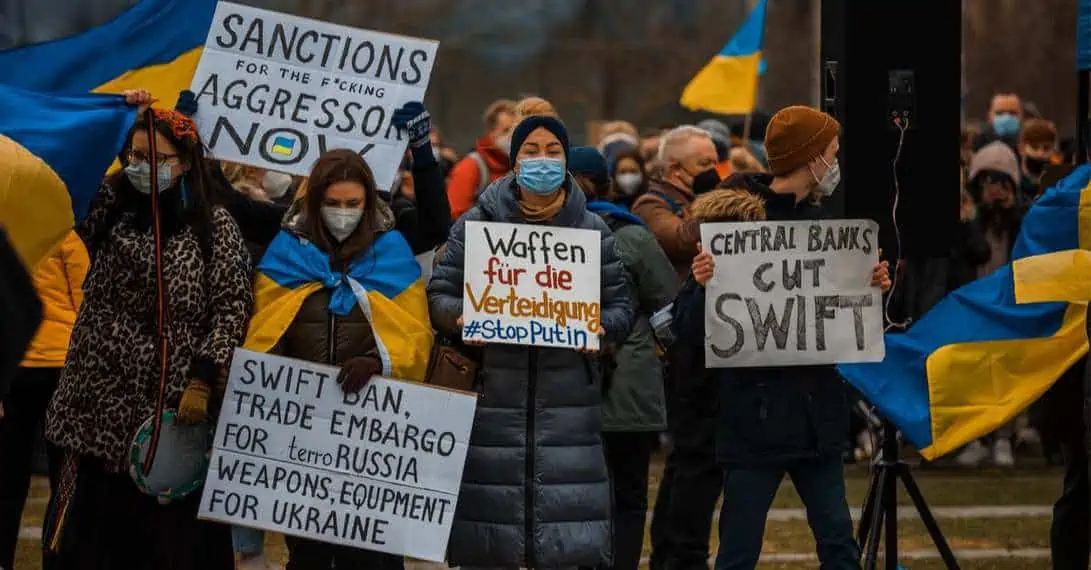The Russian invasion of Ukraine demands a multi-pronged, enduring European response sending a very clear signal to the Kremlin.

‘We are alone to defend our country. Who will fight with us now? To be honest, I don’t see anyone.’ That’s how the president of Ukraine, Volodymyr Zelenskyy, expressed his country’s desperate situation in a video message to his compatriots on Friday.
Ukrainians are fighting Russian aggression with the courage of desperation. With the threat of using nuclear weapons, the Russian federation president, Vladimir Putin, is trying to deter the rest of the world from supporting Ukraine. Given Putin’s recklessness, his words must be taken at face value. And as no one—except Putin—wants to risk the escalation to a nuclear war, the massively outgunned Ukrainians fight on their own.
Putin told the world via television that he wants to resurrect the Russian empire. Ukraine is for him only part of a much bigger game. He will not stop until he is stopped. Ukraine needs international solidarity and help.
Answers needed
In this context, further debate (as in Germany) between those who expressed an accommodative understanding of Russian security concerns and supporters of the expansion of the North Atlantic Treaty Organization unmindful of them is pointless. What is needed, here and now, are answers to a dictator who robs and oppresses his own people, poisons and murders political opponents, invades Ukraine and threatens the world with a nuclear inferno.
Western political mistakes may have contributed to today’s disaster but ultimate blame lies solely with Putin. There is no justification for this war. The talk of ‘genocide’ in the Donbass and ‘neo-Nazis’ in Kyiv is pure Russian propaganda. As in many other European countries, there is an extreme right in Ukraine, but—unlike in Germany, Sweden or France—none of the radical-right parties could get past the 5 per cent threshold during the last parliamentary election.
The attempts by Germany and France to find a diplomatic solution via the ‘Normandy format’ proved as futile as the tough stance of the United States in stopping Putin. With the Russian rejection of mediation, the German reasoning against arms supply was no longer valid. The chancellor, Olaf Scholz, explained to a special sitting of the Bundestag yesterday why his government had decided to provide arms to Ukraine.
Horrible as the atrocities of any war are, every day of successful resistance is a defeat for Putin, who needs a Blitzsieg. The world sees the blood of civilian casualties on his hands. Albeit official media coverage is heavily censored in Russia, images of fallen soldiers will reach Russian living rooms and families through ‘social media’ and Telegram channels.
Tough sanctions
Putin has prepared thoroughly for this war and no economic sanctions, no matter how harsh, will hold up the advance of the Russian army. Neither expulsion from the SWIFT financial-transactions system, nor confiscation of oligarch assets nor refusal to buy Russian oil or gas will stop Putin in the short term.
This does not mean rejecting tough sanctions but being clear that these measures will have to be maintained for a long time. Their full effect will unfold not in the next few weeks but in the months and years to come. Economically it is about drying up Russian export revenues. It is about becoming less dependent on Russian raw materials, excluding Russia from modern technologies and denying access to international financial markets.
Whether individual measures are taken today, tomorrow or in the very near future is not decisive. What is is that there be agreement on a comprehensive package of sanctions, implemented strategically and without loopholes, so that the difference between the cost to NATO member states and the damage to Russia is maximised. At the same time, Europe should communicate to the Russian population that these measures are directed against the regime, not Russia itself. Russia has a world to win by getting rid of Putin.
Practical and symbolic
Other steps can however have a quicker effect, practically and symbolically. All members of the government, members of parliament, oligarchs, senior military officers and senior state officials should be denied visas, with immediate effect. Children or close relatives of these persons enduringly in European countries, for study or other purposes, should be expelled. Russian super-rich should be deprived of their residence status and Russian private assets above €100,000 frozen.
Russia should be disinvited from international sporting and cultural events, congresses, trade fairs and so on—yesterday the International Judo Federation suspended Putin as its honorary president and ambassador. At the same time, everything should be done to support the courageous Russian people on the streets in Moscow, St Petersburg and other cities and the many hundreds of journalist and academics who have spoken out against this war.
In addition to arms deliveries, there is a need for economic aid, medical supplies and basic goods for the Ulrainian population. Solidarity demonstrations are important to show Ukrainians every day that the world is on their side. The massive turnout at yesterday’s demonstration in Berlin was a powerful show of empathy and support. The speeches must be backed up with practical help and a willingness to accept some economic privations for the defence of Ukraine.
Open borders
In addition, the European Union’s borders must be opened for those who flee from the war. The neighbouring states must be given comprehensive help in this task by the EU and all member states must stand in solidarity and take in refugees. This is not only a state but also a social responsibility. In Germany in 2015 millions of people welcomed refugees from Syria, with unprecedented empathy and willingness to help. Today, the Ukrainian people need this support from governments and societies at large.
Every opportunity for negotiation should of course be taken to resolve the conflict. The longing for a détente policy, in the spirit of the Ostpolitik of the former chancellor Willy Brandt, is especially deeply rooted in Germany—but it takes two to tango. Meaningful talks are impossible without Russia’s genuine willingness to seek a peaceful solution rather than to dictate by war. Putin clearly does not show such willingness as yet.
In the short term, only a Ukrainian miracle on the battlefield can bring him to the negotiating table. But in support of Ukraine the west must make it clear to Putin that even a military victory would be Pyrrhic. It has to use political isolation, economic sanctions and military deterrence to send an unwavering message: if Russia does not stop the war and respect Ukrainian sovereignty, its future will be as an economically stagnant global pariah.
Frank Hoffer is non-executive director of the Global Labour University Online Academy.

